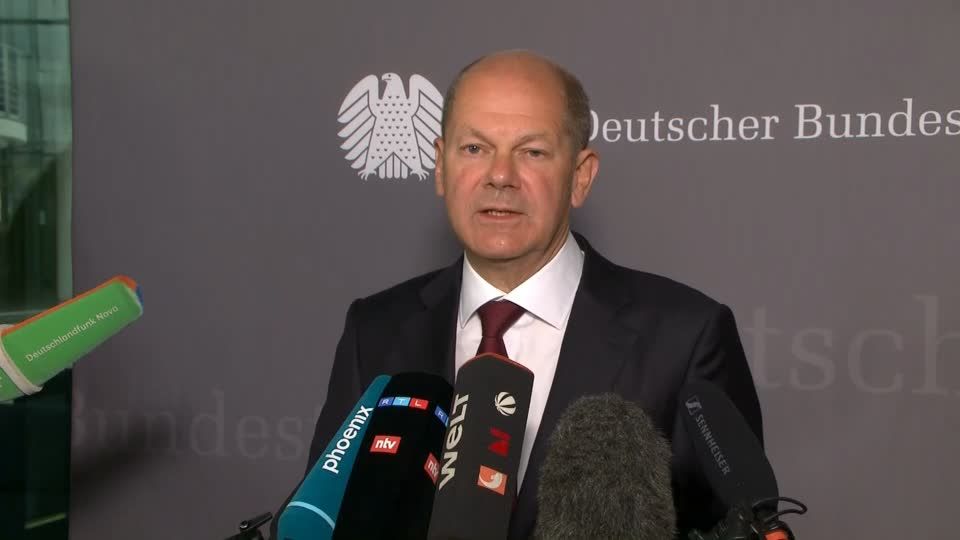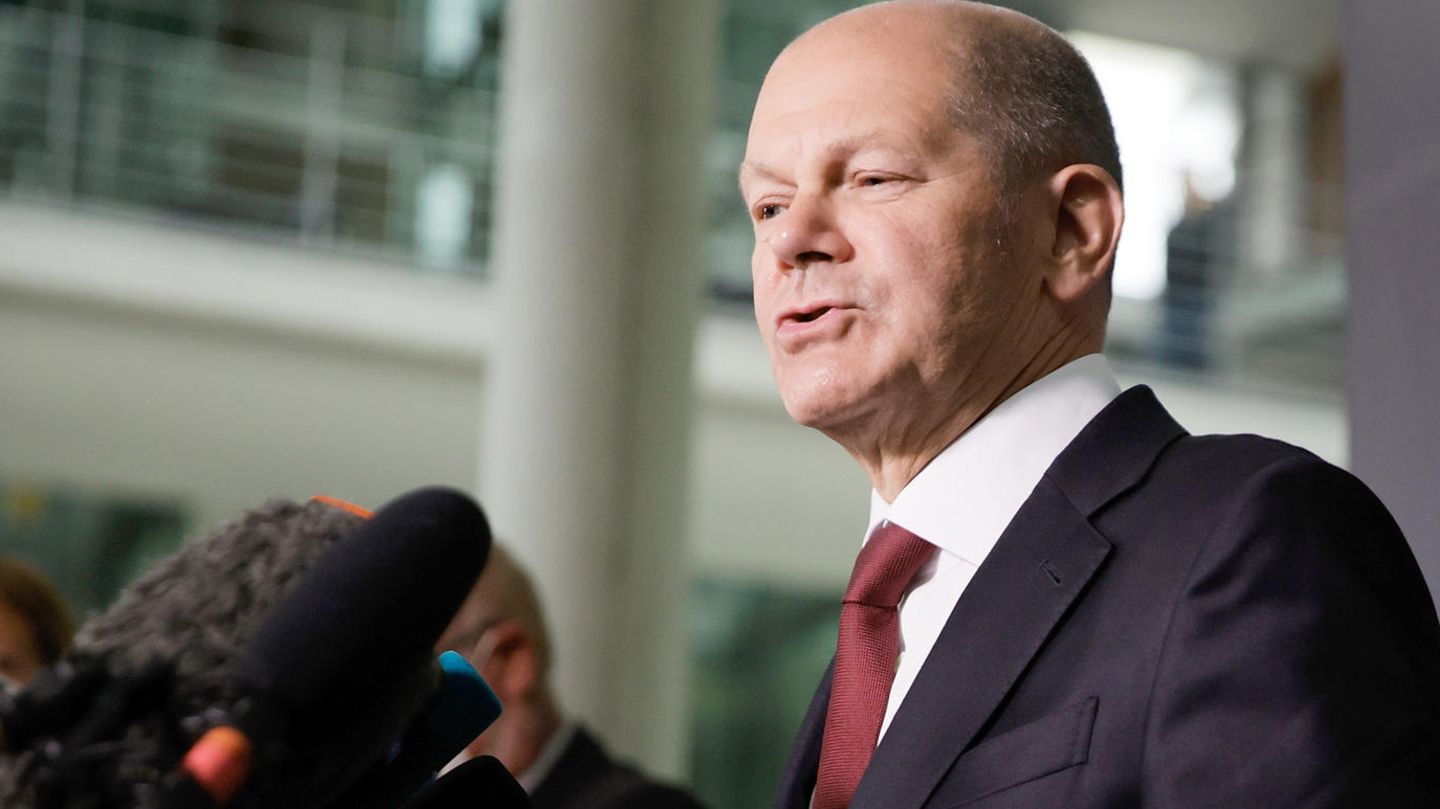And yet he comes: Shortly before the Bundestag election, Olaf Scholz appears in person before the Bundestag Finance Committee. It concerns allegations against the customs unit FIU. Scholz is hard to pack for the opposition and the Union.
While the Union and the opposition are up front about the expected absence of the SPD candidate for chancellor, Olaf Scholz scurries through the rear entrance into the hall. Contrary to all expectations, on Monday he will personally attend the meeting of the finance committee on the affair surrounding the anti-money laundering unit FIU, which is shaking up his election campaign just days before the election next Sunday.
Hardly anyone had expected that – and accordingly they had prepared themselves aggressively: “Those who post respect should also show respect for parliament and the public,” emphasized the FDP politician Florian Toncar before the meeting with a view to Scholz’s election campaign topic “Respect”. Now the finance minister is sitting there – and taking the wind out of the sails of his critics. For around 30 minutes he explains the reforms that have already been achieved at the FIU, then he answers questions from all political groups, one after the other, like a witness in the committee of inquiry.

Olaf Scholz: back entrance “the next one on my way”
Scholz does not answer why he came himself and did not allow himself to be switched on. The fact that he had to cancel an election campaign event in Baden-Württemberg is clearly annoying to him. But you tried to make everything possible. Then why the back entrance? “I came through the entrance that was the next on my way,” says Scholz simply. The opposition could also have requested a secret meeting, forcing Scholz to appear in person.
The finance committee wanted to really get to the bottom of the chancellor candidate six days before the general election. The background is investigations against employees of the FIU, an anti-money laundering special unit of the customs in Cologne, which is assigned to Scholz’s Ministry of Finance. FIU employees are said to have not passed on information about terrorist financing to the judiciary and the police in good time. In this context, the Osnabrück public prosecutor knocked at the finance and justice ministries to inspect documents.
Ministry of Justice criticizes the FIU’s actions
The most important question is now: “Have guidelines from Berlin led to huge loopholes in the fight against money laundering?”, Said the FDP financial politician Toncar. The core problem is the so-called risk-based approach. “There is a grid with which money laundering reports are filtered, but this grid is apparently so coarse that we have legal vacancies in the fight against money laundering in Germany that it is possible to act criminally on a large scale.” The search in the ministries is only a symptom of the problem.
According to a report by the SWR, the SPD-led Federal Minister of Justice considers the risk-oriented approach of the anti-money laundering unit FIU to be incompatible with the Money Laundering Act. The procedure was “legally extremely questionable,” it said in a letter from the Justice Department from May. The FIU must immediately forward “all relevant information” not only in the case of money laundering and terrorist financing, but also in the case of other criminal offenses, “regardless of the risk-oriented approach”. If this is not the case, “the transfer practice must be checked” in order to ensure compliance with the provisions of the Money Laundering Act.
Scholz defends FIU and announces improvements
Scholz rejected the allegations against the FIU before the committee on Monday. The authority has achieved more in the past three years than in the previous 30 years. Its staff has been increased and it has been given a modern IT structure. The number of messages will continue to increase. The criteria which money laundering reports are passed on to the authorities would be further improved. Scholz also met FIU boss Christof Schulte in the committee – for the first time in his time as minister personally.
The Greens accused the finance minister of having used the meeting for self-expression. “Once again, as finance minister, Scholz has rejected all responsibility for the chaos at the anti-money laundering authority FIU and in the fight against money laundering,” said financial politician Lisa Paus. “Olaf Scholz did not do enough to fight money laundering.” Greens federal manager Michael Kellner states that the SPD candidate for chancellor is unwilling to provide information.
As expected, the CDU chairman Armin Laschet was dissatisfied. “What we have heard of statements so far has not cleared up the dimension that needs to be cleared up,” said the Union Chancellor candidate in Berlin, without giving details. Laschet praised the fact that, contrary to the announcement, Scholz had appeared in person before the committee. “To even consider not being there was a weakening of parliament,” he criticized nonetheless.
Search in Scholz Ministry possibly illegal
The search in Scholz’s ministry just a few days before the federal election had also raised questions. According to the Ministry of Justice, the documents sought had been offered to the public prosecutor’s office long beforehand. The public prosecutor, however, presented the telephone call in question in such a way that the ministry initially refused to hand over the documents and referred to “the great official channel”. So it was decided to request searches in both houses. It is unanimously said that the investigators were able to see the documents in question without any problems.
There was speculation about an election campaign background, among other things, because the head of the Osnabrück public prosecutor, Bernard Südbeck, is also a CDU member, as is Lower Saxony’s Justice Minister Barbara Havliza. The spokesman for the investigative authority rejected these speculations: the investigation would not be led by Südbeck, he said. The constitutional lawyer Joachim Wieland nevertheless considers the search to be illegal. There are “sweeping doubts about the required proportionality,” he wrote in a blog entry. “There is no apparent reason for the sharp sword of a search. It was not necessary and therefore illegal.”
David William is a talented author who has made a name for himself in the world of writing. He is a professional author who writes on a wide range of topics, from general interest to opinion news. David is currently working as a writer at 24 hours worlds where he brings his unique perspective and in-depth research to his articles, making them both informative and engaging.




